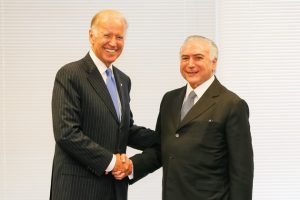The Intercept reports this week: “Brazil’s president Michel Temer Says Rousseff was impeached for refusing his economic agenda,” and “Brazil’s Impeached Ex-President Dilma Rousseff Says Successor ‘Confessed to the Coup.’”
MARIA LUISA MENDONCA, [Currently in the U.S.]
marialuisam222[at]gmail
Mendonça is director of Brazil’s Network for Social Justice and Human Rights. She is also a professor in the International Relations department at the University of Rio de Janeiro and the editor of the book Human Rights in Brazil.
She said today: “There is no crime accusation against Dilma, so it was a coup to force a regime change in Brazil, not a legitimate impeachment trial.
“The illegitimate regime in power is implementing austerity measures that will create more social and economic instability, such as cuts of investments in education, health care, and retirement plans. It’s also proposing to legalize corruption by changing the law about campaign contributions.
“Another risk is the privatization of natural resources such as land and offshore oil reserves, which will increase the risk of environmental destruction.”
ALEXANDER MAIN, [in D.C.] via Dan Beeton, beeton[at]cepr.net, @ceprdc
Recently back from Brazil, Main is senior associate on international policy at the Center for Economic and Policy Research.
He said today: “The Obama administration continues to celebrate and support the new, illegitimate rightwing government of Michel Temer which took power following the baseless impeachment of elected president Dilma Rousseff. On Sept. 22, Vice President Joe Biden met with Temer and ‘commended [him] for his commitment to maintaining Brazil’s regional and global leadership role during the recent period of political change in Brazil.’ On Sept. 27, U.S. Treasury Secretary Jacob Lew met with Brazilian Finance Minister Mereilles and applauded the Temer government’s neoliberal economic reform program, which includes drastic public sector cuts, privatizations, and pension reforms, stating that the program would help Brazil ‘realize its enormous growth potential.’
“It’s disturbing to see how the U.S. administration is going out of its way to bolster Brazil’s undemocratic political transition, and throwing its support behind the sort of neoliberal policy prescriptions that had such a damaging economic and social impact on Latin America in the 1980s and 1990s and that have been explicitly rejected by the Brazilian electorate.
“With president Dilma Rousseff out of the way, we’re now seeing an intensification of a campaign to discredit former president Lula da Silva, who remains Brazil’s most popular political figure and who was expected to run again for president in 2018. This campaign includes biased and increasingly shrill attacks by Brazil’s most powerful private media outlets — such as Globo and Veja — as well as what can only be described as the judicial persecution of Lula da Silva by an investigative judge who has ties to the U.S. State Department and has illegally leaked tapped phone conversations of Lula, among other questionable activities.”
